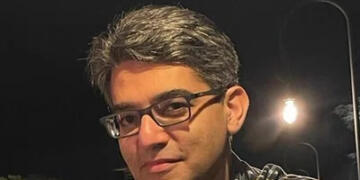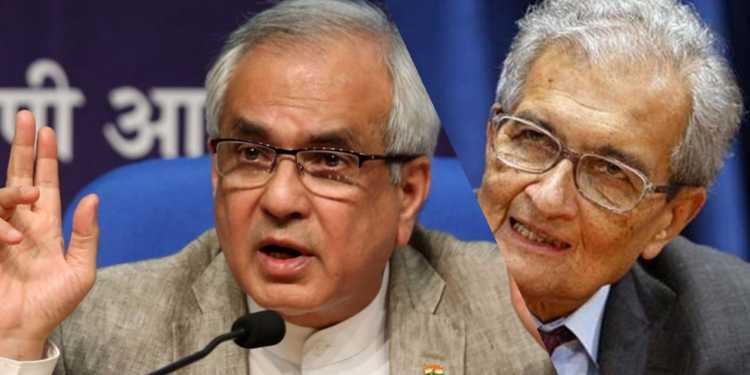Rajiv Kumar, Vice-chairman of NITI Aayog has given a befitting reply to the ‘quantum jump backward since 2014′ remark of Nobel laureate Amartya Sen. Kumar in an interview with PTI said “I wish Professor Amartya Sen would spend some time within India and actually look at conditions on the ground. And at least review all work that has been done in the last four years by the Modi government before making such statements.”
Dr. Amartya Sen is a professor at Harvard University and spends most of his time in the United States. Although as a public intellectual who has been patronized by previous governments, he keeps making remarks about policymaking and governance in India, with or without a serious study of policies. Rajiv Kumar challenged Dr. Sen by saying, ”I actually would like to challenge him to show me another period of four years where so much work has been done for the making India cleaner, inclusive and more caring economy. If these things are not clear to him, then, I think he should spend some time here.”
On July 17, Professor Sen was in India after a long time period to launch Bharat aur Uske Virodhabhas – the Hindi edition of his book An Uncertain Glory: India and its Contradictions. Written by Jean Dreze and Amartya Sen, the original English edition was released in 2013. As Amartya Sen rightly puts it, “90 percent of the work in the book is done by Jean Dreze while Sen gets 90 percent of the credit.“
This statement by Rajiv Kumar makes it very clear that Prof Sen has made outrageous statements without an in-depth study of policies. The timing of the book release seems opportunistic as the English version of the book was released in 2013, just a year before the general election, while the Hindi edition is also being released just a year before the upcoming Lok Sabha elections. The book is being put in the public domain just a year before the general elections to set the tone of the elections as well as the issues on which the election should be fought. It is also an attempt to provide a framework for policymaking to the upcoming government.
The main contributor to the book, Jean Dreze is a professor at Ranchi University. He was a member of National Advisory Council (NAC) which is an advisory body set up by the first United Progressive Alliance (UPA) government to advise the Prime Minister of India. The NAC was criticized by people from within and outside the government for not being in line with India’s constitution because of the possibility that it might emerge as an alternative cabinet. It was an effort by people outside the government to influence policymaking without any constitutional or legal mandate to do so. Jean Dreze had conceptualized and drafted the first version of the MGNREGA which proved to be a monumental failure. MGNREGA was one of the most inefficient policies implemented by the Indian government; it sucked up a lot of money from the government’s coffer without any positive result on the ground.
The basic point of contention between left-wing economists and right-wing economists is whether economic growth or development should be the objective of policymaking. The argument put by economists like Amartya Sen and Jean Dreze is that development should be the prime objective. Right-wing economists on the other hand like Jagdish Bhagwati, Arvind Pangariya, Bibek Debroy, Rajiv Kumar and Sanjeev Sanyal argue that economic growth itself is a reply to development objectives.
Policymaking in India largely focused on redistribution rather than the creation of wealth till the 1980s. The economic liberalization in 1991 was a paradigm shift in policymaking away from redistribution and towards growth. There is substantial proof that the right-wing economic policies have been able to achieve developmental objectives in the country. The poverty elevation has been highest in post-liberalization years and social security has grown exponentially. So the left wing economists seem pretty irrelevant as their idea has been tried and failed earlier. The previous UPA government again tried concept and messed up the economy of the country. Now, the right-wing economists should be given the chance to try and test their theories and policies. The shift from ‘Sen to Bhagwati’ is much required for the Indian economy.


























